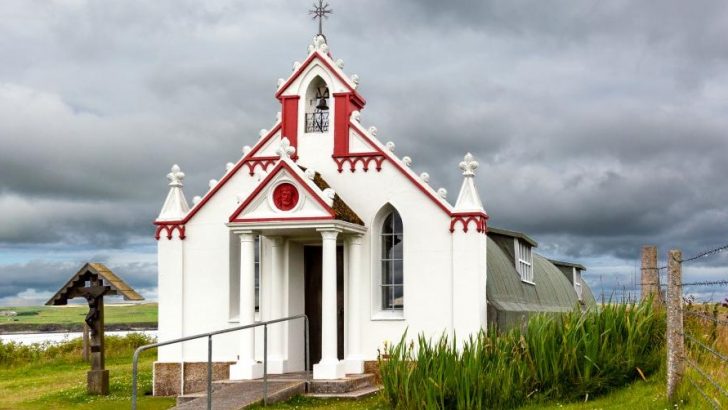Notebook
Recently I was reading about a little remote uninhabited island off the coast of Scotland. It is one of the Orkney Islands called Lamb Holm. It was there that Italian prisoners of World War II were kept from 1942 to 1945.
They left something behind – a tiny chapel. Among the prisoners was a gifted artist called Domenico Chiocchetti. In a conversation with the prison chaplain the idea of building a chapel emerged.
Under Chiocchetti’s guidance, the prisoners built it with their own hands out of anything they could find: scraps of wood and the tin cans from the bully beef they got for their rations. The end result was something of a masterpiece which still attracts many visitors today. But why did these prisoners of war want to build a church? We could hazard a guess that, back home, in normal times, they rarely went to the many beautiful churches around them. But now, far from their families and the warm Mediterranean climate this tiny church became a sign of God, and all that God in Christ can mean.
The chapel and the extra-ordinary effort by the prisoners to build it from meagre resources also spoke volumes about their spiritual yearning for God in their lives.
No doubt they were frightened and worried about their fate and the fate of their families back home in German occupied Italy.
Hope
The beautiful little chapel also became a symbol of hope for these men, the kind of hope that can only come from God, a power above them, within them, greater than Hitler and Mussolini and greater than all their war-time troubles.
Our country was thrown into a form of national panic this week at the prospect of returning to the full lockdown restrictions we all endured in the early spring.
Critics were demanding to see the scientific and medical proof for needing to bring in such restrictions to our freedoms once again. All through this pandemic, we have been told how important science is for understanding the virus and its unstoppable progress in every area of our lives.
Despite the fact that we have witnessed many scientific and medical experts disagree about some fundamental aspects of this pandemic and how to deal with it, there can be no doubt that these professionals play a vital role in understanding what is happening and how to find solutions. Equally true is, that like no other crisis in history, a big part of the solution lies in the personal responsibility that each one of us takes for our actions.
Science
Beyond the science, the experts and the role of personal responsibility, surely there must now be also the realisation that we, like the Italian prisoners on Lamb Holm, also need to look to this higher power above us and within us.
The words of St Paul to the Philippians last Sunday come to mind. “There is no need to worry; but if there is anything you need, pray for it, asking God for it with prayer and thanksgiving, and that peace of God, which is so much greater than we can understand, will guard your hearts and thoughts.”
Pastoral problems!
There was once a very rough parish council meeting. Strong opinions were expressed and sharp disagreements surfaced. The parish priest was at the receiving end of much of the criticism. The next day, one of the council members felt bad about the whole meeting and asked the PP if he had slept well after the meeting had ended. He replied:”I slept like a baby.” “Really?” “Yes, I woke up every hour crying!’”
Fear for the future
Dear God, my guide and protector, fear of the future gnaws at me. Thoughts of what might happen disrupt my equanimity. I long to have a safe and secure life, full of joy and well being. Help me to recognise my fears, to see how they push me around and shove me into deadening corners.
Do not let them have control over me. Protect me from all those concerns that threaten to overwhelm me when I think about this situation. I give myself and all my worries into your wise and merciful care. I entrust to your loving heart my anxiety and my weariness.
You are near, guiding my life.
May this truth hold me fast.
– Joyce Rupp


 The church at
Lamb Holm
The church at
Lamb Holm 